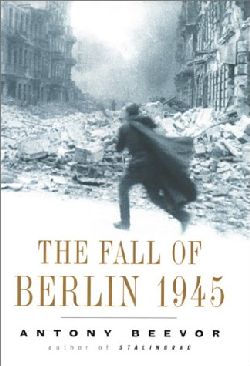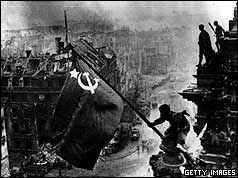The Fall of Berlin * * *
 The Fall of Berlin is the follow-up book by the author of Stalingrad: the Final Siege. TFOB starts as the Russians cross the German border in East Prussia. For those who are spotty on their post-WWI geography (meaning 99.999% of us), Prussia was is in the Baltics (meaning up by Lithuania) and extended across modern day northern Germany (formerly East Germany), Western Poland, parts of Lithuania, and far southwestern Russia (parts it annexed after WWII from Germany). Much of the first third of the book is about the invasion of Prussia and the attempts by civilians to escape. This was especially interesting to me because I know someone who's mother and grandmother were among those civilians. About 1/4 million civilians were trapped in Konigsberg at one point, completely surrounded by the Russian Army. My friend's mother was trapped there and was among those that crossed the ice of Frisches Haff (a bay) on foot to reach a small spit of land that the Germans still held. From there they walked into Germany through a thin corridor of German-held land to East Germany. Later after the Germans surrendered, they escaped from East Germany to the West.
The Fall of Berlin is the follow-up book by the author of Stalingrad: the Final Siege. TFOB starts as the Russians cross the German border in East Prussia. For those who are spotty on their post-WWI geography (meaning 99.999% of us), Prussia was is in the Baltics (meaning up by Lithuania) and extended across modern day northern Germany (formerly East Germany), Western Poland, parts of Lithuania, and far southwestern Russia (parts it annexed after WWII from Germany). Much of the first third of the book is about the invasion of Prussia and the attempts by civilians to escape. This was especially interesting to me because I know someone who's mother and grandmother were among those civilians. About 1/4 million civilians were trapped in Konigsberg at one point, completely surrounded by the Russian Army. My friend's mother was trapped there and was among those that crossed the ice of Frisches Haff (a bay) on foot to reach a small spit of land that the Germans still held. From there they walked into Germany through a thin corridor of German-held land to East Germany. Later after the Germans surrendered, they escaped from East Germany to the West.The Germans civilians in Prussia were understandably terrified of the Russians. They had been inundated by propaganda about how the ruthlessness the Russians and the horrors they would do against Germans. But soldiers who had been on the Eastern Front knew that the Russians would be driven by revenge -- rather than ruthlessness per se. One Berliner recalled being on a subway when an old soldier announced how Berlin would be flattened if the Russians won, "If they win, they will do to us what we did to them." As it was, the Germans of East Prussia were still unprepared for the fury of revenge. The first target as the troops came were women. The book contains many first-hand accounts that any woman spotted was gang-raped by 10 to 40 soldiers at a time. Deliberate shooting of civilians seems to have been rare, however lines of fleeing refugees were repeatedly straffed by aircraft and run over by tanks. I think to understand in part what the Russians did when they came into East Prussia, you have to understand what the German Army did to Russia. The German Army carried out a policy of living off the land (meaning taking food, shelter, firewood, etc from civilians), laying siege to cities, and Slavic cleanings. Slavs were considered an "inferior race" and there was widespread killing of civilians. t is estimated that 11 million Soviet Union civilians were killed during WWII! In addition, the out-matched Russian Army suffered horrific casualties (like 50% or so). Russian POWs were sent to concentration camps and suffered the same fate as Jews; as the Russians came into Poland, they discovered these concentration camps with Russian POWs. I'm not trying to justify their actions, but rather show the context in which they occurred.
The second half of the book covers the race to Berlin and the downfall of Berlin.
 Surprisingly this part of the book was not terribly interesting (for me). Lots of space is devoted to troop movements (yawn). You don't get a sense from the book about what the civilians in Berlin went through. This is surprising since there were many diaries published from that period. For some reason, this part just seemed a bit mechanical. Basically, the sense you get from the book is that Berlin fell without much of a fight in the city proper and then people started getting on with their lives. That's hard for me to believe. The city was reduced to rubble and the depression among the people must have been extreme. My next book is "A Woman in Berlin" which is a diary from the 9 days of the battle. I expect that this book will give a different picture.
Surprisingly this part of the book was not terribly interesting (for me). Lots of space is devoted to troop movements (yawn). You don't get a sense from the book about what the civilians in Berlin went through. This is surprising since there were many diaries published from that period. For some reason, this part just seemed a bit mechanical. Basically, the sense you get from the book is that Berlin fell without much of a fight in the city proper and then people started getting on with their lives. That's hard for me to believe. The city was reduced to rubble and the depression among the people must have been extreme. My next book is "A Woman in Berlin" which is a diary from the 9 days of the battle. I expect that this book will give a different picture.Labels: Berlin, Eastern Front, Germany, WWII

<< Home